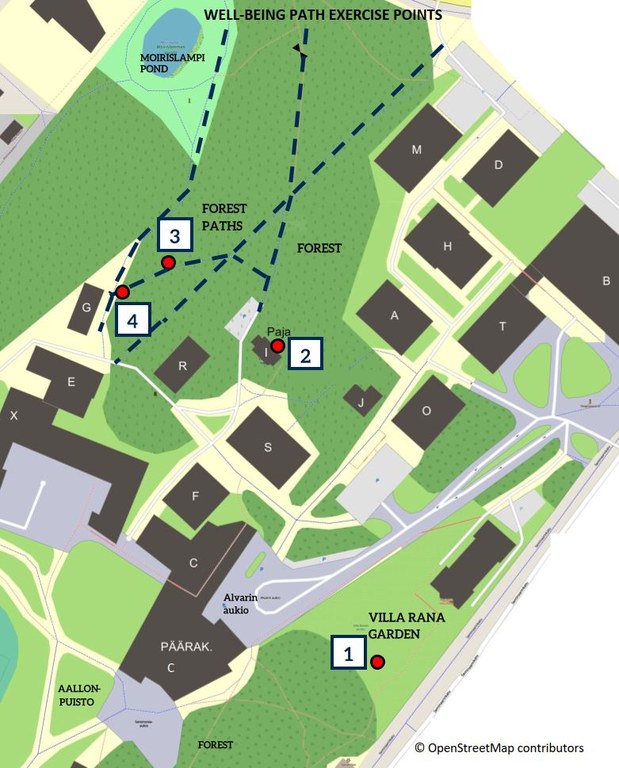Values
Get yourself into a comfortable position. Lay down in the hammock and find a peaceful place. Take three deep breaths. It is time to focus on yourself now. Then look around for a while. What do you see in the nature around you? Now concentrate and listen to nature’s sounds. What do you hear around you?
Next, think for a while what things in life are important to you. What makes you happy? What do you want to do?
Next, think of one deed guided by your values which you could do today. It doesn’t have to be a big one, even small actions are steps towards a meaningful life for yourself now and in the future.
You can increase psychological flexibility by clarifying your values and taking committed actions.1 Psychological flexibility means the ability to contact the present moment and behave according to one’s own values.2 Studies have shown that psychological flexibility is important for well-being.2,3 For example, it has been shown that psychological flexibility is associated with fewer symptoms of depression and anxiety4 as well as less work-related stress.5 It is important for your well-being that you take time to clarify your values and live by them.
Values are those things that you consider significant, and they guide your behavior. Values are often compared to a compass because they guide our behavior and tell us what we should focus on. They help you live the life you want. When you clarify your own values, it becomes easier to pursue those things that are meaningful for you.1 Consider values in different life domains, such as family, work and free time.2 In addition, put your values in order of importance so you can consider which value is more important to you than another. Remember, too, that values can change over time.
If you want to live according to your values, set goals based on your values and take committed actions, which means actions guided by your values.1 Committed actions help you achieve your goals and dreams. A committed action can be either physical or psychological.1 You can take committed actions daily. They can even be small ones, because small actions are also steps towards a meaningful life. The most important thing, however, is that you remember to take committed actions in your daily life. If you don’t, it is not possible to live by your values, no matter how clear they are in your mind. Use the above exercise in your daily life and ask yourself: “What committed action could I take today?”
MORE INFO:
You can increase psychological flexibility by clarifying your values and taking committed actions1. Psychological flexibility means the ability to contact the present moment and behave according to one’s own values2. Studies have shown that psychological flexibility is important for well-being2,3 .For example, it has been shown that psychological flexibility is associated with fewer symptoms of depression and anxiety4 as well as less work-related stress5. It is important for your well-being that you take time to clarify your values and live by them.
Values are those things that you consider significant, and they guide your behavior. Values are often compared to a compass because they guide our behavior and tell us what we should focus on. They help you live the life you want. When you clarify your own values, it becomes easier to pursue those things that are meaningful for you.1 Consider values in different life domains, such as family, work and free time.2 In addition, put your values in order of importance so you can consider which value is more important to you than another. Remember, too, that values can change over time.
If you want to live according to your values, set goals based on your values and take committed actions, which means actions guided by your values.1 Committed actions help you achieve your goals and dreams. A committed action can be either physical or psychological.1 You can take committed actions daily. They can even be small ones, because small actions are also steps towards a meaningful life. The most important thing, however, is that you remember to take committed actions in your daily life. If you don’t, it is not possible to live by your values, no matter how clear they are in your mind. Use the above exercise in your daily life and ask yourself: “What committed action could I take today?”
References
1 Harris, R. (2019). ACT made simple: An easy-to-read primer on acceptance and commitment therapy (2nd ed). Oakland, CA: New Harbinger Publications
2 Hayes, S. C., Luoma, J. B., Bond, F. W., Masuda, A., & Lillis, J. (2006). Acceptance and commitment therapy: Model, processes and outcomes. Behaviour Research and Therapy, 44(1), 1-25. https://doi.org/10.1016/j.brat.2005.06.006
3 Marshall, E., & Brockman, R. N. (2016). The Relationships Between Psychological Flexibility, Self-Compassion, and Emotional Well-Being. Journal of cognitive psychotherapy, 30(1), 60-72. https://doi.org/10.1891/0889-8391.30.1.60
4 Masuda, A., & Tully, E. C. (2012). The Role of Mindfulness and Psychological Flexibility in Somatization, Depression, Anxiety, and General Psychological Distress in a Nonclinical College Sample. Journal of evidence-based complementary & alternative medicine, 17(1), 66-71. https://doi.org/10.1177/2156587211423400
5 Wersebe, H., Lieb, R., Meyer, A. H., Hofer, P., & Gloster, A. T. (2018). The link between stress, well-being, and psychological flexibility during an Acceptance and Commitment Therapy self-help intervention. International journal of clinical and health psychology, 18(1), 60-68. https://doi.org/10.1016/j.ijchp.2017.09.002

